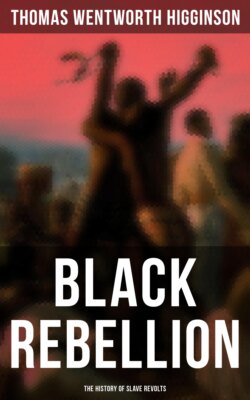Black Rebellion: The History of Slave Revolts

Реклама. ООО «ЛитРес», ИНН: 7719571260.
Оглавление
Thomas Wentworth Higginson. Black Rebellion: The History of Slave Revolts
Black Rebellion: The History of Slave Revolts
Table of Contents
THE MAROONS OF JAMAICA
THE MAROONS OF SURINAM
GABRIEL'S DEFEAT
DENMARK VESEY
NAT TURNER'S INSURRECTION
APPENDIX OF AUTHORITIES
THE MAROONS OF JAMAICA
THE MAROONS OF SURINAM
GABRIEL'S DEFEAT
DENMARK VESEY
NAT TURNER'S INSURRECTION
Отрывок из книги
Thomas Wentworth Higginson
Published by
.....
Capt. Cudjoe and Capt. Accompong, and the other founders of Maroon independence, had passed away; and "Old Montagu" reigned in their stead, in Trelawney Town. Old Montagu had all the pomp and circumstance of Maroon majesty: he wore a laced red coat, and a hat superb with gold lace and plumes; none but captains could sit in his presence; he was helped first at meals, and no woman could eat beside him; he presided at councils as magnificently as at table, though with less appetite; and possessed, meanwhile, not an atom of the love or reverence of any human being. The real power lay entirely with Major James, the white superintendent, who had been brought up among the Maroons by his father (and predecessor), and who was the idol of this wild race. In an evil hour, the Government removed him, and put a certain unpopular Capt. Craskell in his place; and as there happened to be, about the same time, a great excitement concerning a hopeful pair of young Maroons, who had been seized and publicly whipped on a charge of hog-stealing, their kindred refused to allow the new superintendent to remain in the town. A few attempts at negotiation only brought them to a higher pitch of wrath, which ended in their despatching the following peculiar diplomatic note to the Earl of Balcarres: "The Maroons wishes nothing else from the country but battle, and they desires not to see Mr. Craskell up here at all. So they are waiting every moment for the above on Monday. Mr. David Schaw will see you on Sunday morning for an answer. They will wait till Monday, nine o'clock, and if they don't come up, they will come down themselves." Signed, "Col. Montagu and all the rest."
It turned out, at last, that only two or three of the Maroons were concerned in this remarkable defiance; but meanwhile it had its effect. Several ambassadors were sent among the insurgents, and were so favorably impressed by their reception as to make up a subscription of money for their hosts, on departing; only the "gallant Col. Gallimore," a Jamaica Camillus, gave iron instead of gold, by throwing some bullets into the contribution-box. And it was probably in accordance with his view of the subject, that, when the Maroons sent ambassadors in return, they were at once imprisoned, most injudiciously and unjustly; and when Old Montagu himself and thirty-seven others, following, were seized and imprisoned also, it is not strange that the Maroons, joined by many slaves, were soon in open insurrection.
.....